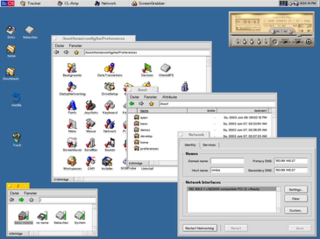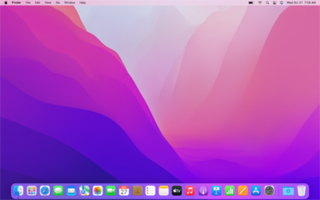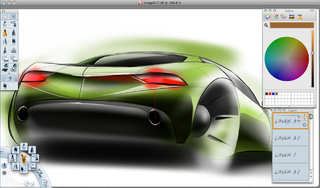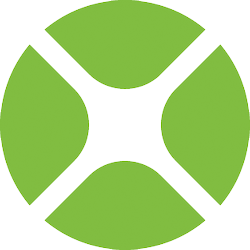
BeOS was an operating system for personal computers first developed by Be Inc. in 1990. It was first written to run on BeBox hardware.

macOS is a proprietary graphical operating system developed and marketed by Apple Inc. since 2001. It is the primary operating system for Apple's Mac computers. Within the market of desktop and laptop computers it is the second most widely used desktop OS, after Microsoft Windows and ahead of Chrome OS.
Adobe Flash is a multimedia software platform used for production of animations, rich web applications, desktop applications, mobile apps, mobile games, and embedded web browser video players. Flash displays text, vector graphics, and raster graphics to provide animations, video games, and applications. It allows streaming of audio and video, and can capture mouse, keyboard, microphone, and camera input.
OpenStep is a defunct object-oriented application programming interface (API) specification for a legacy object-oriented operating system, with the basic goal of offering a NeXTSTEP-like environment on non-NeXTSTEP operating systems. OpenStep was principally developed by NeXT with Sun Microsystems, to allow advanced application development on Sun's operating systems, specifically Solaris. NeXT produced a version of OpenStep for its own Mach-based Unix, stylized as OPENSTEP, as well as a version for Windows NT. The software libraries that shipped with OPENSTEP are a superset of the original OpenStep specification, including many features from the original NeXTSTEP.

PagePlus was a desktop publishing program developed by Serif for Microsoft Windows. The first version was released in 1991 as the first commercial sub-£100 DTP package for Microsoft Windows. The final release was PagePlus X9, which was released in November 2016. In June 2019 it was officially replaced by Serif with Affinity Publisher.

Adobe FrameMaker is a document processor designed for writing and editing large or complex documents, including structured documents. It was originally developed by Frame Technology Corporation, which was bought by Adobe.
The history of macOS, Apple's current Mac operating system formerly named Mac OS X until 2012 and then OS X until 2016, began with the company's project to replace its "classic" Mac OS. That system, up to and including its final release Mac OS 9, was a direct descendant of the operating system Apple had used in its Macintosh computers since their introduction in 1984. However, the current macOS is a Unix operating system built on technology that had been developed at NeXT from the 1980s until Apple purchased the company in early 1997.

Final Cut Pro is a series of non-linear video editing software programs first developed by Macromedia Inc. and later Apple Inc. The most recent version, Final Cut Pro 10.6.1, runs on Mac computers powered by macOS Big Sur 11.5.1 or later. The software allows users to log and transfer video onto a hard drive, where it can be edited, processed, and output to a wide variety of formats. The fully rewritten Final Cut Pro X was introduced by Apple in 2011, with the last version of the legacy Final Cut Pro being version 7.0.3.

BBEdit is a proprietary text editor made by Bare Bones Software, originally developed for Macintosh System Software 6, and currently supporting macOS.

Logic Pro is a digital audio workstation (DAW) and MIDI sequencer software application for the macOS platform. It was originally created in the early 1990s as Notator Logic, or Logic, by German software developer C-Lab which later went by Emagic. American technology company Apple acquired Emagic in 2002 and renamed Logic to Logic Pro. It is the second most popular DAW – after Ableton Live – according to a survey conducted in 2015.

Sketchbook, is a raster graphics software app intended for expressive drawing and concept sketching also for making animations. The software was first developed by Alias Systems Corporation as StudioPaint, before being acquired by Autodesk and then being spun out into an independent company, Sketchbook, Inc. Originally developed as commercial software, it evolved into a subscription model before eventually being made freeware for personal use. In 2021, Sketchbook Pro, the desktop version of the app available on Microsoft Windows and macOS, became a paid software available through the Microsoft Store and Mac App Store.

Freeway is a WYSIWYG web design application for Mac OS X developed by the British company Softpress Systems.

Parallels Server for Mac is a server-side desktop virtualization product built for the Mac OS X Server platform and is developed by Parallels, Inc., a developer of desktop virtualization and virtual private server software. This software allows users to run multiple distributions of Linux, Windows and FreeBSD server applications alongside Mac OS X Server on Intel-based Apple hardware.
The following outline of Apple Inc. is a topical guide to the consumer electronics, software, retail stores, corporate acquisitions, timeline, and personnel under the purview of the American multinational corporation Apple Inc. The company's best-known hardware products are the Macintosh, the iPod, the iPhone, and the iPad. Its best-known software includes the macOS and iOS operating systems, and the iTunes media browser. As of March 2014, Apple has 425 retail stores in 16 countries, and an online store.

The Xojo programming environment and programming language is developed and commercially marketed by Xojo, Inc. of Austin, Texas for software development targeting macOS, Microsoft Windows, Linux, iOS, the Web and Raspberry Pi. Xojo uses a proprietary object-oriented language.

OS X Yosemite is the eleventh major release of macOS, Apple Inc.'s desktop and server operating system for Macintosh computers.

Affinity Publisher is a desktop publishing application developed by Serif for macOS and Microsoft Windows, with an iPadOS version planned for release in 2020. It is a part of the Affinity product line along with Affinity Photo and Affinity Designer.













